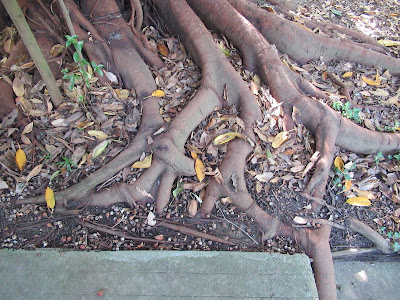
"More than conversation at the interface, it is creative assemblages like these that explore and elaborate the particular dynamic capacities that digital media afford and the ways that through them humans and machines can perform interesting new effects (...) in uniquely particular ways." Lucy Suchman (2009). Human-machine reconfigurations: plans and situated actions.
Oct 23, 2021
October
Oct 10, 2021
Oct 6, 2021
The choice is (still) ours to make
To form a collective will, a «We», "will require the critical production and sharing of knowledge, resistance to flattening aesthetic diversity, and the invention of sustainable models that don´t threaten the viability of the whole, whether economically or ecologically, socially or institutionally" and "asserting a new biocentric imperative for living, producing, and consuming. (...) The choice is (still) ours to make." T.J. Demos (2016). Decolonizing Nature. Contemporary Art and the Politics of Ecology. Image by Monica Pinheiro, license CC BY-NC-SA ( CC ).
Oct 5, 2021
October
"While the transition is eminently doable (...) the truly irresponsible thinking today is accepting the assumption that we can simply continue down the same path forever, or that we can´t do anything to change our direction." T.J. Demos (2016). Decolonizing Nature. Contemporary Art and the Politics of Ecology. Image by Monica Pinheiro, license CC BY-NC-SA ( CC ).
October
Sep 26, 2021
Sep 24, 2021
September
Sep 22, 2021
Sep 20, 2021
micropausa verde
Sep 13, 2021
September
strings
It all started with a string (a) and pieces of wasted biomass (b). Then creating little tensions (c), expanding one bit (d) at a time (e), and allowing infrastructure to grow (f) to shape natural (g), negative carbon shading for my home (h). Unlike artificial shading infrastructures (i), nature-based solutions become better with time (j) and go on sequestering carbon dioxide, cooling (k) the environment (l), and greening our cities (m). If they cease to live, they are still precious as colour pallets (n), compost or biomass for energy (o). Thinking (p) how can I expand the platform to this city balcony small forest... Image by Monica Pinheiro, license CC BY-NC-SA (CC).
Sep 8, 2021
September
September
"Profitez de vos promenades dans la campagne pour vous intéresser à tout ce que vous voyez, non pas superficiellement, mais en vous efforçant, par la reflexion, par la méditation, de pénétrer l´essence même de cette nature." Calouste S. Gulbenkian, n/d. Image by Monica Pinheiro, license CC BY-NC-SA ( CC )
Sep 1, 2021
September
Aug 28, 2021
all shades of green
Between «all or nothing» there are thousands of green variations. Green washing, like inaction, is not green. Its a waste of time and resources that could be applied in more green. None of us can do everything, but each of us can do a lot of green different things. And we need more of these different green things to get the Planet back on track. To sustain all life. Our life, also. We must carry on with green and keep on doing whatever more green we can do. Reducing what we can reduce. Reusing, recycling, composting, gardening, planting, trying some veggies of your own, offering plants, and seeds. Slowing down consumption. Exchanging surplus and ideas with neighbours, family, friends, colleagues. All shades of green are beautiful, fun, healthy, fair and good for the environment.
Image by Monica Pinheiro, license CC BY-NC-SA ( CC )
















